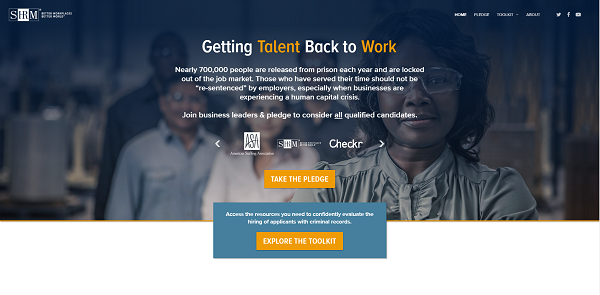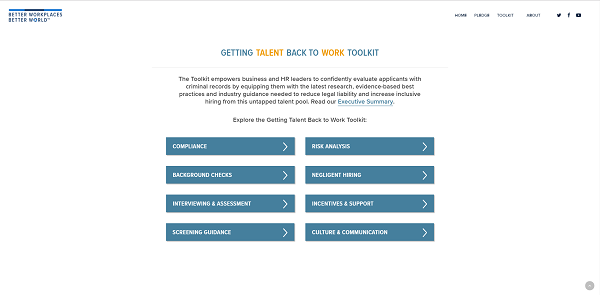Associations and companies representing more than 50 percent of the U.S. workforce committed to changing their recruiting practices to include those with criminal backgrounds in a national initiative announced by Johnny C. Taylor, Jr., president and CEO of SHRM — the Society for Human Resource Management.
In his announcement, Taylor called for action by the business community to follow-up on the passage of the First Step Act by signing the national Getting Talent Back to Work pledge. The pledge is open to all organizations willing to give opportunities to qualified people with a criminal background, deserving of a second chance.
More than 500 organizations, companies and associations have committed to the pledge, including the U.S. Chamber of Commerce, the National Restaurant Association, the National Retail Federation, the American Staffing Association, SHRM, Koch Industries, Dave’s Killer Bread Foundation, Checkr and more.
Ninety-five percent of people in prison will be released —more than 650,000 people each year. As they reenter society, people with criminal backgrounds often are deprived of employment opportunities and organizations are deprived of qualified talent.
Research conducted by SHRM and the Charles Koch Institute highlights the value of allowing workers with criminal backgrounds in the workforce. More than 82 percent of hiring managers in a nationally representative poll indicated workers with a criminal history are a high-quality hire equal to or even more effective than those without a criminal history. HR professionals also say the cost-per-hire is similar for those with and without criminal records.
“This is a group we, as business leaders, cannot afford to overlook, as one in three adults in the United States currently has a criminal background,” said Taylor, SHRM-SCP. “Not only is it the right thing to do — to give a deserving person a second chance — but it is becoming an imperative as businesses continue to experience hiring difficulty at an alarming rate.”
The research found that a majority of workers said they were willing to work with individuals with criminal records.
Hiring managers and HR professionals cited three positive effects: the hiring of most-qualified candidates from a truly diverse pool, the intrinsic value of giving people second chances at employment, and the opportunity to improve the community around them.
To help businesses understand the legal factors involved in hiring workers with a criminal background, SHRM developed a toolkit based on an extensive body of research and evidence-based practices from thousands of enterprises.
“We’re not only encouraging businesses to take the pledge, but we’re providing them with the tools and resources to confidently do so with a step-by-step toolkit,” Taylor said.
The resource is designed to help businesses understand the legal factors about hiring workers with a criminal background, assist employers in applying evidence-based best practices in hiring applicants with a criminal background and provide practical guidance from industry leaders in acquiring, developing and promoting talent.
To sign the pledge, visit Getting Talent Back to Work.
The Society for Human Resource Management (SHRM) is the world’s largest HR professional society, representing 300,000 members in more than 165 countries. For nearly seven decades, the Society has been the leading provider of resources serving the needs of HR professionals and advancing the practice of human resource management. SHRM has more than 575 affiliated chapters within the United States and subsidiary offices in China, India and United Arab Emirates. Visit us at shrm.org.


